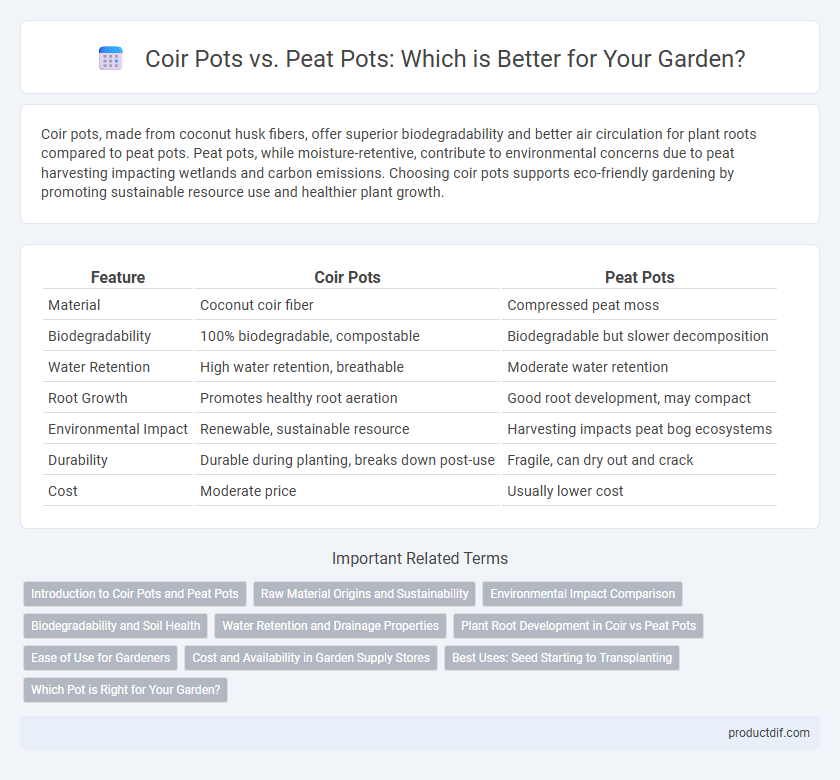Coir pots, made from coconut husk fibers, offer superior biodegradability and better air circulation for plant roots compared to peat pots. Peat pots, while moisture-retentive, contribute to environmental concerns due to peat harvesting impacting wetlands and carbon emissions. Choosing coir pots supports eco-friendly gardening by promoting sustainable resource use and healthier plant growth.
Table of Comparison
| Feature | Coir Pots | Peat Pots |
|---|---|---|
| Material | Coconut coir fiber | Compressed peat moss |
| Biodegradability | 100% biodegradable, compostable | Biodegradable but slower decomposition |
| Water Retention | High water retention, breathable | Moderate water retention |
| Root Growth | Promotes healthy root aeration | Good root development, may compact |
| Environmental Impact | Renewable, sustainable resource | Harvesting impacts peat bog ecosystems |
| Durability | Durable during planting, breaks down post-use | Fragile, can dry out and crack |
| Cost | Moderate price | Usually lower cost |
Introduction to Coir Pots and Peat Pots
Coir pots are biodegradable containers made from coconut husk fibers, prized for their excellent water retention and aeration properties that promote healthy root growth in plants. Peat pots, composed of compressed peat moss, also offer biodegradability and provide moisture retention while gradually breaking down to enrich soil with organic material. Both coir and peat pots are widely used in sustainable gardening for seed starting and transplanting, with coir pots gaining popularity due to their renewable coconut fiber source compared to the slower regenerating peat moss.
Raw Material Origins and Sustainability
Coir pots are made from coconut husk fibers, a renewable agricultural byproduct that decomposes naturally, promoting eco-friendly gardening practices. Peat pots originate from sphagnum peat moss, harvested from peat bogs at a slower regeneration rate, raising sustainability concerns due to habitat disruption and carbon release. The use of coir pots supports sustainable resource management, while peat pots pose ecological challenges linked to non-renewable extraction.
Environmental Impact Comparison
Coir pots, made from coconut husk fibers, offer a sustainable alternative to peat pots by utilizing a renewable resource that decomposes naturally without harming soil ecosystems. Peat pots rely on harvesting peat moss from fragile bog habitats, contributing to habitat destruction and increased carbon emissions. Choosing coir pots significantly reduces environmental impact by supporting ecosystem preservation and lowering the carbon footprint associated with garden supply materials.
Biodegradability and Soil Health
Coir pots biodegrade faster than peat pots, breaking down within 3-6 months and enriching soil with natural fibers that improve aeration and moisture retention. Peat pots decompose more slowly, often taking over a year, which can lead to soil acidity and nutrient imbalances harmful to plant health. Using coir pots supports sustainable gardening by enhancing soil structure and promoting healthier root development without the ecological drawbacks associated with peat extraction.
Water Retention and Drainage Properties
Coir pots exhibit excellent water retention due to their natural fibrous structure, allowing consistent moisture supply to plants while maintaining good aeration. Peat pots absorb water effectively but tend to retain excess moisture, which can impede drainage and increase the risk of root rot. Choosing coir pots supports healthier root development by balancing moisture retention and drainage, especially in environments requiring optimal water management.
Plant Root Development in Coir vs Peat Pots
Coir pots promote healthier plant root development by offering superior aeration and drainage compared to peat pots, which tend to retain more moisture and restrict airflow. The natural fibrous structure of coir encourages robust root expansion and reduces the risk of root rot, enhancing nutrient absorption and plant vitality. In contrast, peat pots can compact over time, limiting root growth and potentially stunting young plants.
Ease of Use for Gardeners
Coir pots offer superior ease of use for gardeners due to their lightweight, flexible structure and natural biodegradability, allowing easy transplantation without root disturbance. Peat pots, while also biodegradable, tend to dry out quickly and can be brittle, making handling and transplanting more challenging. Gardeners prefer coir pots for consistent moisture retention and durability, enhancing seedling growth and simplifying garden workflow.
Cost and Availability in Garden Supply Stores
Coir pots generally cost more than peat pots due to sustainable materials and eco-friendly production, making them a premium option in garden supply stores. Peat pots are widely available and more affordable, benefiting from mass production and extensive distribution channels. Gardeners often find peat pots easier to source in large quantities, while coir pots may require shopping at specialized or organic garden centers.
Best Uses: Seed Starting to Transplanting
Coir pots, made from coconut husk fibers, provide excellent aeration and drainage, making them ideal for seed starting and early-stage transplanting in organic gardening. Peat pots offer superior moisture retention and biodegradability, supporting seedlings that require consistent moisture levels before transplanting. For sustainable garden supplies, coir pots are preferred for faster root growth, while peat pots excel in maintaining humidity during seedling development.
Which Pot is Right for Your Garden?
Coir pots, made from natural coconut fiber, offer superior water retention and biodegradability, promoting healthier root growth compared to traditional peat pots. Peat pots, derived from decomposed sphagnum moss, are lightweight and easy to handle but have environmental concerns due to peat harvesting's impact on peatland ecosystems. Choosing the right pot depends on your garden's sustainability goals and plant moisture needs, with coir pots being the eco-friendlier and more durable choice for long-term growth.
Coir pots vs Peat pots Infographic

 productdif.com
productdif.com